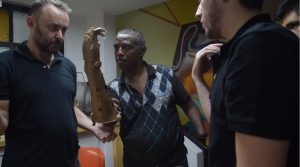
E-Nable Medellin founder Adam Armfield (left) helps José Asprilla with his new prosthetic hand.
José Asprilla’s arm ends where his new hand begins. The double amputee bends his right arm, carefully watching the prosthetic hand clutch and release in sync with his movement. Adam Armfield, the founder of e-NABLE Medellín, holds out an empty bottle in front of him. José aligns his plastic hand, bends his arm and grabs it – the first time he has done so in almost two decades.
Tucked away in a second-storey space off one of the busiest streets in El Poblado, the not-for-profit organization is making the impossible, possible: they are giving new limbs and a new lease on life to those injured in the nation’s 52-year internal conflict.
Thousands of people continue to live with amputations in Colombia, and the not-for-profit is harnessing the power of 3D printing to create and donate personalized, prosthetic limbs to landmine and other victims of the bloody conflict, as well as children with birth defects.
Regular prosthetics can cost anywhere from $5000 to $10,000 – but using new technology allows limbs of any shape to be created at a fraction of the time and cost, Armfield said. Some new prosthetics for children have been created in the style of Iron Man, and others with the colours and logo of the Medellin football team Atlético Nacional.
“Instead of having to spend thousands of dollars on a design team, on molding, on prototypes which could take weeks or months, we can turn over changes in a matter of hours or days,” he said.
The organization of volunteers, which launched in 2017, is on track to helping 25 people this year get new prosthetic limbs in the department of Antioquia, the region with the most disabled people in the country.
José lost both of his arms in a machete attack when an armed group raided his
village in Antioquia in 2001. The civilian victim sustained serious head and arm injuries, and was left for dead. Now, 17 years after the attack, José remains positive in the hope that a prosthetic will help him regain some of the independence that was taken from him.
Stories like José’s are not rare. Approximately 3,600 people in Colombia have suffered amputation due to the internal conflict, and 26 percent of ex-combatants have amputations.
José, 45, said that the most difficult thing to come to terms with has been his inability to work.
“I’ve had many stumbles. The last years I had this idea that people are always rejecting you, looking at you badly, but thanks to all the people who have supported and helped us at this moment,” he said.
José believes he would not have his prosthetic today without the work of the organization. “The fact that I have a hand now will give me a better way to survive and get ahead, it is very exciting.”
As Colombia’s fragile peace agreement with FARC rebels faces setbacks, in the form of murders of social leaders, the arrest of an ex-FARC leader, and the election of a president who has been critical of the peace accord, e-NABLE Medellin continues to work with the victims of the war with plans to double their patient list next year.





